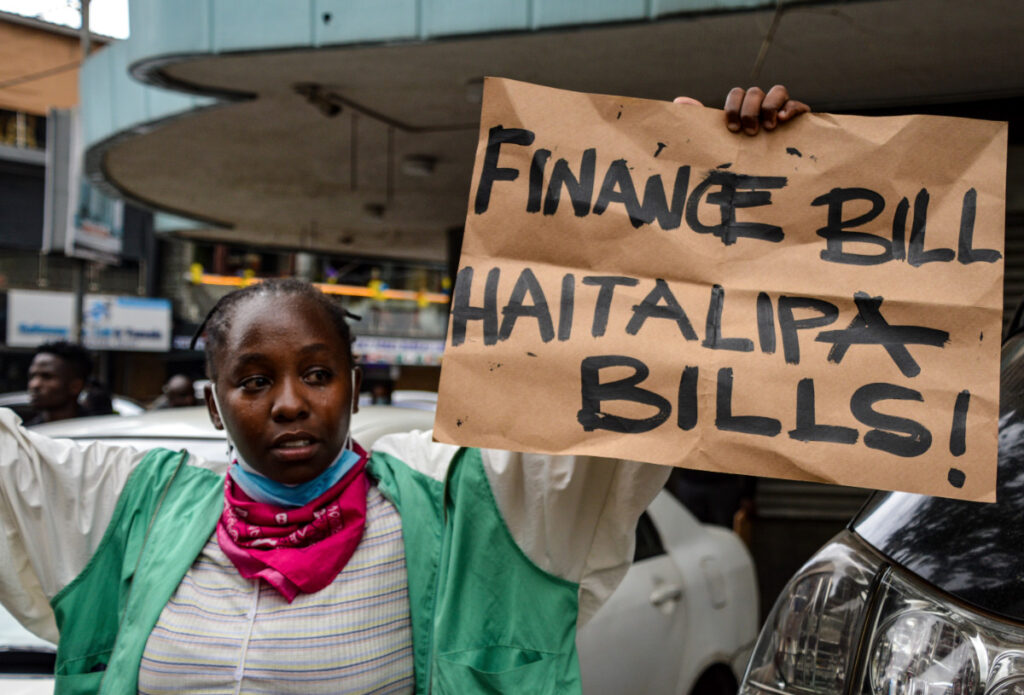The Finance Bill, 2024 has sparked significant uproar across Kenya, leading to widespread demonstrations and public outcry. Citizens have taken to the streets to protest against the proposed tax increases, expressing their frustration and discontent with the government’s financial policies during a period of economic hardship.
The protests have been marked by large gatherings in major cities, including Nairobi, Mombasa, Kisumu, Eldoret and Nakuru. Citizens from diverse generations and the working class have united to voice their opposition to the bill, carrying placards and chanting slogans that reflect their dissatisfaction with the increased tax burden. The demonstrations have sometimes escalated into confrontations with law enforcement, highlighting the intensity of public sentiment against the bill.



Peaceful protesters raising their voices in Kenya: Credits
The Government of Kenya emphasizes that the Finance Bill 2024 aims to strengthen revenue collection to support essential infrastructure and social programs. However, this has been met with public skepticism, given the current economic difficulties. At this juncture, we advocate for open and transparent dialogue with all stakeholders to rebuild public trust and ensure that these resources are utilized effectively.
The Data privacy Controversy
As an organization, we firmly hold the opinion that personal data is invaluable and must not be used without explicit consent. The right to personal data privacy is a fundamental principle that must be upheld at all times. This stance is central to our ongoing campaign, #FichaUchi, which aims to raise awareness among citizens about their digital footprints and the importance of data privacy.
The Finance Bill, 2024 contains a controversial provision that would allow the Kenya Revenue Authority (KRA) to access individuals’ personal data for tax evaluation and enforcement. This has sparked serious concerns regarding data privacy and protection.
Key Points and Concerns
- Proposal for KRA Access to Personal Data: Clause 63 of the Finance Bill proposes amending the Data Protection Act to allow KRA unrestricted access to personal data for tax purposes.
- Privacy Infringement: Concerns have been raised that granting such extensive access to a government agency without adequate safeguards could lead to privacy violations. Stakeholders emphasize the necessity of protecting citizens’ financial records and personal data from unwarranted government surveillance.
- Constitutional Rights: The proposal may not meet the constitutional standards set forth in Articles 31(c) and (d) of the Constitution of Kenya, which safeguard the right to privacy.
- Existing Legal Provisions: Section 51 of the Data Protection Act outlines the conditions for data access and sharing. Additionally, Section 60 of the Tax Procedures Act (TPA) permits data access by the commissioner or an authorized officer with a warrant for tax administration purposes. These existing provisions are deemed sufficient for KRA to fulfill its duties without compromising privacy rights.
The Committee has sided with the stakeholders’ concerns, recommending the removal of Clause 63. They stress the importance of protecting personal data and maintaining adherence to both the Constitution and the Data Protection Act. The Committee also suggests streamlining tax declaration and payment processes rather than expanding KRA’s access to personal data.

Commitment to Data Privacy
We remain steadfast in our commitment to promoting data privacy and protecting individual rights. Personal data should never be exploited without consent, and the trust between citizens and institutions should be built on the assurance that their information is secure. Our campaign, #FichaUchi, serves as a reminder to both citizens and governments of the importance of maintaining the integrity and confidentiality of personal data.
By continuing our efforts through #FichaUchi, we aim to foster a culture of privacy awareness and advocate for policies that protect the personal data of all individuals. We believe that through collective action and vigilant oversight, we can ensure that personal data remains protected and the right to privacy is preserved for everyone.













